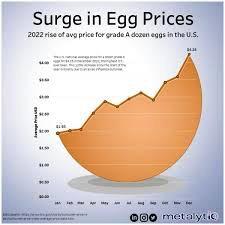 Claire Kelloway, affiliated with the Open Markets Institute, recently commented on food inflation attributing high prices to the ability of large companies with market power to raise prices. This conclusion was based on a study conducted at the University of Massachusetts, Amherst. For the duration of the COVID pandemic, consumers applied their financial resources, including government support payments to purchase food items and consumables. This resulted in a classic case of “too much money available for too few products”. Kelloway attributes the fact that there was considerable consolidation among suppliers with too few smaller competitors offering similar products at lower prices to reduce inflation.
Claire Kelloway, affiliated with the Open Markets Institute, recently commented on food inflation attributing high prices to the ability of large companies with market power to raise prices. This conclusion was based on a study conducted at the University of Massachusetts, Amherst. For the duration of the COVID pandemic, consumers applied their financial resources, including government support payments to purchase food items and consumables. This resulted in a classic case of “too much money available for too few products”. Kelloway attributes the fact that there was considerable consolidation among suppliers with too few smaller competitors offering similar products at lower prices to reduce inflation.
Eggs represented the outstanding food product that demonstrated inflation. Although it is generally accepted that the depopulation of 44 million hens over a one-year period disturbed the equilibrium between supply and demand, the increase in the price of eggs was disproportionate to the reduction in supply. In contrast, the precipitous drop in prices approximating 70 percent of the previous peaks occurred over a four-week period had little relationship to the increase in numbers of hens.
 Fluctuation in price, hen numbers as influenced by H5N1 depopulation should be an interesting subject for economists. A factor that should be considered is the amplification of upward and downward movement in the market influenced by the widely used benchmark price discovery system that applied specifically to eggs. The daily benchmark price used by buyers for supermarket chains is essentially a self-fulfilling prophecy and detracts from the long-term interest of producers, retailers and especially, consumers.
Fluctuation in price, hen numbers as influenced by H5N1 depopulation should be an interesting subject for economists. A factor that should be considered is the amplification of upward and downward movement in the market influenced by the widely used benchmark price discovery system that applied specifically to eggs. The daily benchmark price used by buyers for supermarket chains is essentially a self-fulfilling prophecy and detracts from the long-term interest of producers, retailers and especially, consumers.
In evaluating possible remedial action, Ms. Kelloway cites price-gouging laws, taxes on windfall profits and as a last resort, government intervention. None of these remedies is consistent with a free market economy. A Midwest, large Chicago Mercantile Exchange quotation would be far more equitable as promoted by EGG-NEWS and supported by prominent producers.